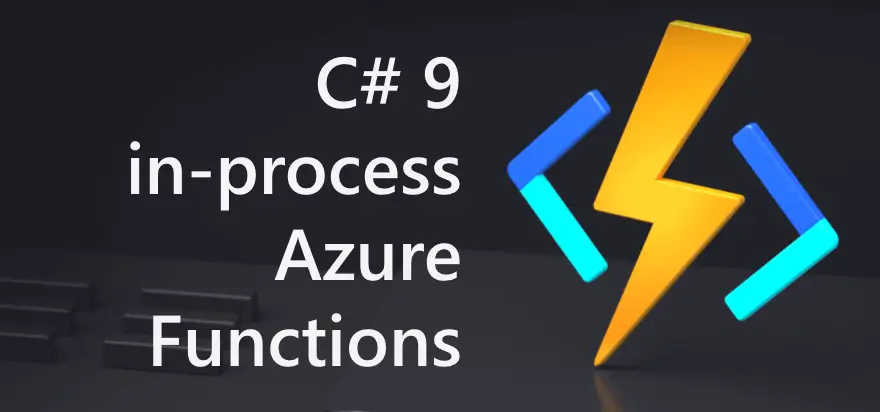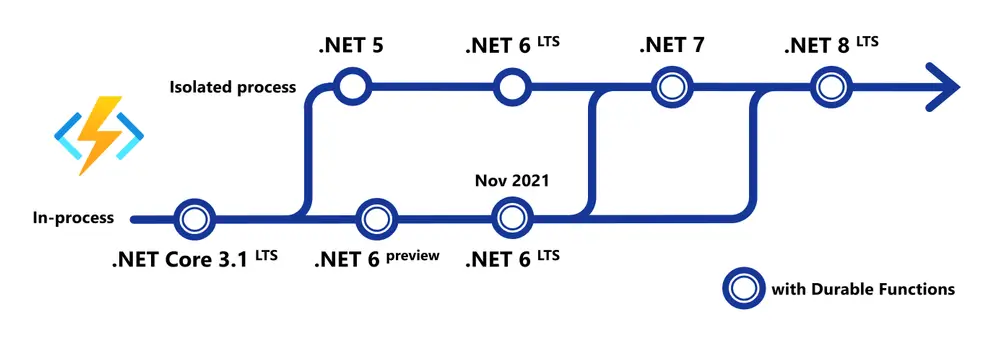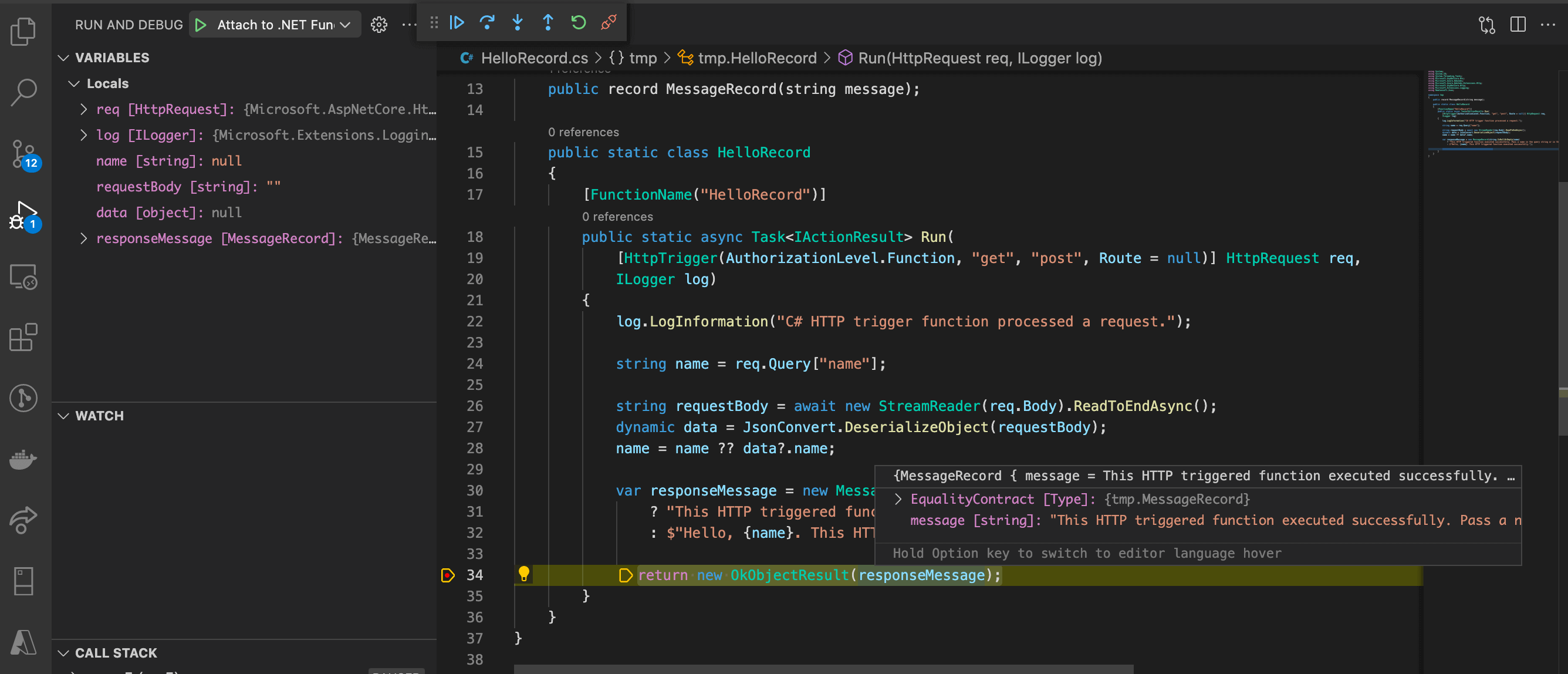C# 9 in-process Azure Functions
C# 9 has some amazing features. Azure Functions are have two modes: isolated and in-process. Whilst isolated supports .NET 5 (and hence C# 9), in-process supports .NET Core 3.1 (C# 8). This post shows how we can use C# 9 with in-process Azure Functions running on .NET Core 3.1.

Azure Functions: in-process and isolated
Historically .NET Azure Functions have been in-process. This changed with .NET 5 where a new model was introduced named "isolated". To quote from the roadmap:
Running in an isolated process decouples .NET functions from the Azure Functions host—allowing us to more easily support new .NET versions and address pain points associated with sharing a single process.
However, the initial launch of isolated functions does not have the full level of functionality enjoyed by in-process functions. This will happen, according the roadmap:
Long term, our vision is to have full feature parity out of process, bringing many of the features that are currently exclusive to the in-process model to the isolated model. We plan to begin delivering improvements to the isolated model after the .NET 6 general availability release.
In the future, in-process functions will be retired in favour of isolated functions. However, it will be .NET 7 (scheduled to ship in November 2022) before that takes place:

As the image taken from the roadmap shows, when .NET 5 shipped, it did not support in-process Azure Functions. When .NET 6 ships in November, it should.
In the meantime, we would like to use C# 9.
Setting up a C# 8 project
We're have the Azure Functions Core Tools installed, so let's create a new function project:
func new --worker-runtime dotnet --template "Http Trigger" --name "HelloRecord"
The above command scaffolds out a .NET Core 3.1 Azure function project which contains a single Azure function. The --worker-runtime dotnet parameter is what causes an in-process .NET Core 3.1 function being created. You should have a .csproj file that looks like this:
<Project Sdk="Microsoft.NET.Sdk">
<PropertyGroup>
<TargetFramework>netcoreapp3.1</TargetFramework>
<AzureFunctionsVersion>v3</AzureFunctionsVersion>
</PropertyGroup>
<ItemGroup>
<PackageReference Include="Microsoft.NET.Sdk.Functions" Version="3.0.11" />
</ItemGroup>
<ItemGroup>
<None Update="host.json">
<CopyToOutputDirectory>PreserveNewest</CopyToOutputDirectory>
</None>
<None Update="local.settings.json">
<CopyToOutputDirectory>PreserveNewest</CopyToOutputDirectory>
<CopyToPublishDirectory>Never</CopyToPublishDirectory>
</None>
</ItemGroup>
</Project>
We're running with C# 8 and .NET Core 3.1 at this point. What does it take to get us to C# 9?
What does it take to get to C# 9?
There's a great post on Reddit addressing using C# 9 with .NET Core 3.1 which says:
You can use
<LangVersion>9.0</LangVersion>, and VS even includes support for suggesting a language upgrade.However, there are three categories of features in C#:
- features that are entirely part of the compiler. Those will work.
- features that require BCL additions. Since you're on the older BCL, those will need to be backported. For example, to use init; and record, you can use https://github.com/manuelroemer/IsExternalInit.
- features that require runtime additions. Those cannot be added at all. For example, default interface members in C# 8, and covariant return types in C# 9.
Of the above, 1 and 2 add a tremendous amount of value. The features of 3 are great, but more niche. Speaking personally, I care a great deal about Record types. So let's apply this.
Adding C# 9 to the in-process function
To get C# into the mix, we want to make two changes:
- add a
<LangVersion>9.0</LangVersion>to the<PropertyGroup>element of our.csprojfile - add a package reference to the
IsExternalInit
The applied changes look like this:
<Project Sdk="Microsoft.NET.Sdk">
<PropertyGroup>
<TargetFramework>netcoreapp3.1</TargetFramework>
+ <LangVersion>9.0</LangVersion>
<AzureFunctionsVersion>v3</AzureFunctionsVersion>
</PropertyGroup>
<ItemGroup>
<PackageReference Include="Microsoft.NET.Sdk.Functions" Version="3.0.11" />
+ <PackageReference Include="IsExternalInit" Version="1.0.1" PrivateAssets="all" />
</ItemGroup>
<ItemGroup>
<None Update="host.json">
<CopyToOutputDirectory>PreserveNewest</CopyToOutputDirectory>
</None>
<None Update="local.settings.json">
<CopyToOutputDirectory>PreserveNewest</CopyToOutputDirectory>
<CopyToPublishDirectory>Never</CopyToPublishDirectory>
</None>
</ItemGroup>
</Project>
If we used dotnet add package IsExternalInit, we might be using a different syntax in the .csproj. Be not afeard - that won't affect usage.
Making a C# 9 program
Now we can theoretically use C# 9.... Let's use C# 9. We'll tweak our HelloRecord.cs file, add in a simple record named MessageRecord and tweak the Run method to use it:
using System;
using System.IO;
using System.Threading.Tasks;
using Microsoft.AspNetCore.Mvc;
using Microsoft.Azure.WebJobs;
using Microsoft.Azure.WebJobs.Extensions.Http;
using Microsoft.AspNetCore.Http;
using Microsoft.Extensions.Logging;
using Newtonsoft.Json;
namespace tmp
{
public record MessageRecord(string message);
public static class HelloRecord
{
[FunctionName("HelloRecord")]
public static async Task<IActionResult> Run(
[HttpTrigger(AuthorizationLevel.Function, "get", "post", Route = null)] HttpRequest req,
ILogger log)
{
log.LogInformation("C# HTTP trigger function processed a request.");
string name = req.Query["name"];
string requestBody = await new StreamReader(req.Body).ReadToEndAsync();
dynamic data = JsonConvert.DeserializeObject(requestBody);
name = name ?? data?.name;
var responseMessage = new MessageRecord(string.IsNullOrEmpty(name)
? "This HTTP triggered function executed successfully. Pass a name in the query string or in the request body for a personalized response."
: $"Hello, {name}. This HTTP triggered function executed successfully.");
return new OkObjectResult(responseMessage);
}
}
}
If we kick off our function with func start:

We can see we can compile, and output is as we might expect and hope. Likewise if we try and debug in VS Code, we can:

Best before...
So, we've now a way to use C# 9 (or most of it) with in-process .NET Core 3.1 apps. This should serve until .NET 6 ships in November 2021 and we're able to use C# 9 by default.
